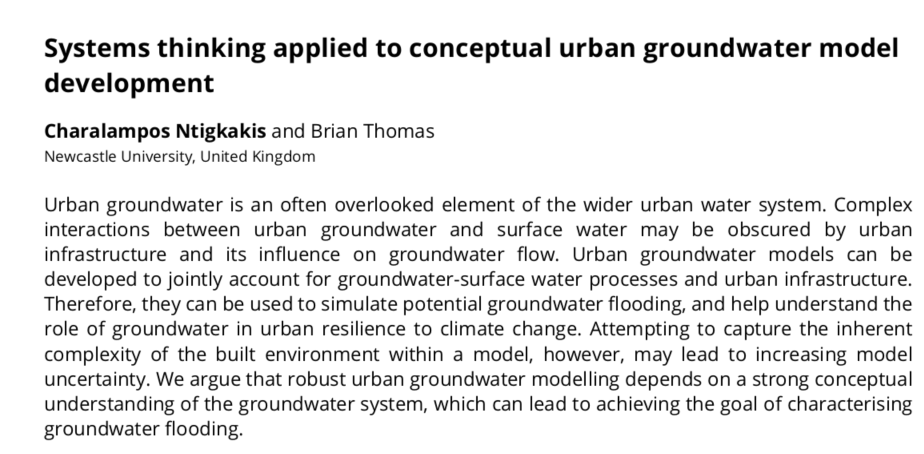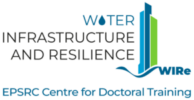Polly Grundy attends a Royal Society of Chemistry One Day Meeting
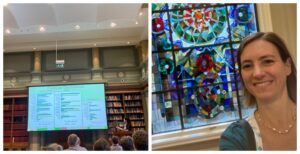
Polly Grundy from cohort III attended a one day meeting held by the Royal Society of Chemistry on ‘How to deal with the issues of emerging contaminants of concern in the aquatic environment’. The meeting focused on industry perspective, regulatory issues and the monitoring of these emerging contaminants. It included presentations from experts in the field on the different types of contaminants such as pharmaceuticals and personal care products, antibiotics, veterinary medicines, plant protection products, Per- and Poly-fluorinated Substances (PFAS) and microplastics present in our water bodies.
Philippa Mohan and Kaeli Brazier Present at the International Conference on Urban Drainage
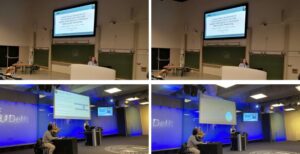
Philippa Mohan from cohort II and Kaeli Brazier from cohort IV presented their research work at the International Conference on Urban Drainage, held from 9-14 June 2024 at Delft University of Technology, Netherlands.
The conference was held in collaboration with the International Water Association and the International Association for Hydraulic Research through the Joint Committee Urban Drainage.
Anna Christy Attends an Input-Output Modelling Course at Leiden University
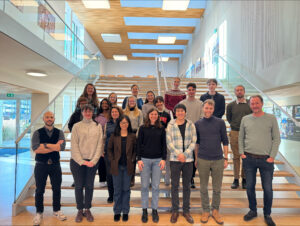
Anna Christy from cohort III from Newcastle University attended an Input-Output modelling course at Leiden University held from 14-19 January 2024. She was also invited to give a seminar on her research for their Industrial Ecology group on 6 March 2024.
Ravina Bains Participates in IWA ASPIRE and UKWIR 4th Annual Conferences
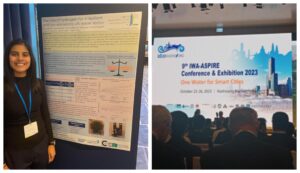
Ravina Bains from cohort 2 of CDT WIRe participated in the 9th IWA-ASPIRE conference held in Taiwan recently with the theme ‘One Water for Smart Cities’. At the conference, she presented on ‘Investigating the Impacts of Wastewater Final Effluent on Electrolysis for Hydrogen Production’.
She also participated in the UKWIR 4th Annual Conference held in London where she presented a poster on ‘The Role of Hydrogen for a Resilient and Low Emissions UK Water Sector’. The theme of the conference was ‘Positively influencing the water sector through research and innovation’.
Anne Kamau Presents a Poster at the IWA 8th International Water Association Specialist Conference on Natural Organic Matter
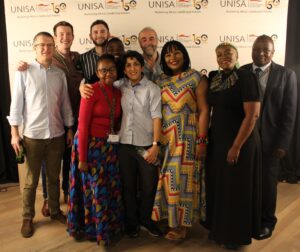
The 8th International Water Association Conference on Natural Organic Matter provided a platform for researchers and experts to delve into the intricate world of natural organic matter (NOM) in water systems. CDT WIRe’s Anne Kamau presented a poster, titled “Formation of nitrogenous disinfection by-products in drinking water,” aimed to contribute valuable insights into the role that NOM plays in influencing the formation of these disinfection by-products. The presentation highlighted our innovative research methodologies, including advanced analytical techniques and state-of-the-art instrumentation, to comprehensively analyse the composition and behaviour of organic matter in various water environments. She addressed key challenges in understanding organic matter dynamics, such as its sources, transformation processes, and impacts on water quality. Attendees had the opportunity to engage in meaningful discussions, exchange ideas, and explore potential collaborations with fellow researchers and industry professionals.
The overall experience at the conference provided a unique platform for networking, learning about cutting-edge research in the field, and fostering collaborations that will contribute to advancing our collective understanding of natural organic matter in water systems.
Isabel Carneiro and Ishara Perera visit Newcastle University
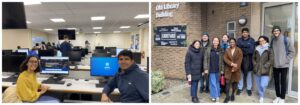
Isabel Carneiro Cardoso da Silva and Ishara Perera from University of Sheffield (UoS) attended an MSc module on Geographic Information Systems led by Dr Craig Robson, Lecturer in Data-centric Civil (and Geospatial) Engineering at Newcastle University. Isabel and Ishara both identified this module as highly relevant to their projects. This module has proved very popular throughout the WIRe Programme, with previous students attending from UoS and Cranfield in the past. The team at Newcastle arranged a catch-up and lunch session for Isabel and Ishara along with the other WIRe students at the university.
Samuel Yeboah Nyarko Presents at the IWA NOM8 Conference
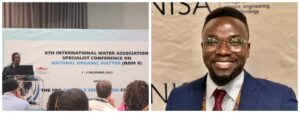
Samuel Yeboah Nyarko, from the third cohort of WIRe presented on ‘Natural Organic Matter Removal by Coagulation and Ion-exchange in Lowland Surface Water Treatment: Impact on Treatment and Operational Benefits’, at the 8th International Water Association Specialist Conference on Natural Organic Matter (NOM8). The conference was hosted by UNISA in December 2023.
During his presentation, Samuel discussed how pH, hydrophobicity, and molecular weight aid in understanding NOM removal by coagulation and ion-exchange processes, particularly in water sources with high alkalinity and hydrophilic DOC content.
Edward John Wins the Prestigious Peter Watson Prize for Young Engineers
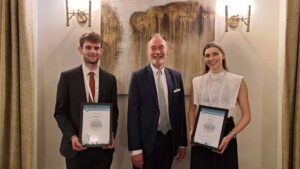
In picture: Edward John (University of Sheffield, winner), John Yates (judge and EIS chairman), Beth Eames (University of Oxford, Highly Commended Presentation)
Edward John from The University of Sheffield (UoS) won the Peter Watson Prize for young engineers for his presentation on “Proactive pipe management: Multiaxial fatigue of water pipe grey cast iron”. The event was hosted and organised by the Engineering Integrity Society (EIS). Speaking after receiving the award, Edward said, “The award has definitely given me a confidence boost for future presentations and it is nice to have my research recognised in this way.”
Read a short interview with Edward here.
Philippa Mohan Participates in the CIWEM Urban Drainage Group Conference
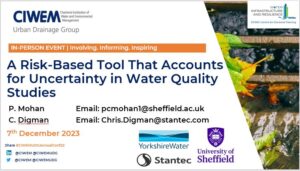
CDT WIRe’s Philippa Mohan presented on a risk based tool that accounts for uncertainty in water quality studies at the recently held CIWEM Urban Drainage Group event. She talked about how uncertainty in the data we use to monitor discharges of sewage into rivers can alter the understanding of if harm has occurred or not.
CDT WIRe Researchers at the UKWIR 4th Annual Conference
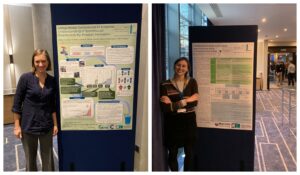
CDT WIRe students Polly Grundy, Ali Leonard, Alethea Goddard, Ravina Bains, Killian Gleeson, Jade Rogers, Anne Kamau, Thomas Langshaw, Edward John, Dimitris Athanasopoulos-Tseles, Harry Nicklin and Anna Laino, along with other colleagues, attended the UKWIR 4th Annual Conference held in London recently. The aim of the conference was to bring people together to promote inspiration and innovation in the water sector.
The WIRe students contributed by presenting their work as posters and taking time in the breaks between sessions to discuss their research with fellow conference attendees from across the water industry.
CDT WIRe@Newcastle Winter Symposium 2023
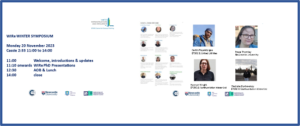
The CDT WIRe@Newcastle Winter Symposium was held in November 2023. The Symposium was an opportunity for our new students, Cohort V, to introduce themselves to their peers and the WIRe academic colleague network at Newcastle University to learn more about what previous STREAMers have gone on to achieve in their careers post study. All the WIRe PhDs at Newcastle presented their research work to-date and future aspirations at the Symposium.
CDT WIRe Students at Summer Challenge Week 2023
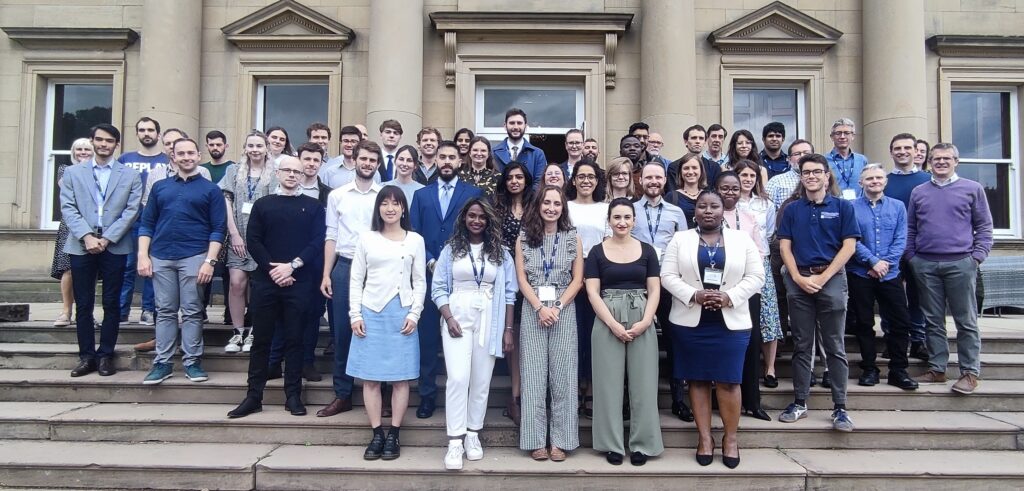
Organised by the University of Sheffield, the week challenged the students to think out of the box and participate in outreach activities that involved engaging school children in educational, yet interesting water related games. The aim of this year’s challenge was to enhance the social skills of the students, their ability to break down complex water engineering concepts and make them interesting and engaging to school children.
An important part of the week was the one-day conference. The day started with a presentation on research impact from Tony Conway, Visiting Professor at University of Sheffield followed by full presentations by cohort I researchers and alternated by three-minute poster pitches by cohort II students.
Congratulations to Lucie Bertolaso for winning the Best WIRe poster and to Jade Rogers and Daniel Ruth for winning the Best Three Minute Poster pitch and the Best WIRe Presentation prizes respectively. Jennifer Hollands from cohort IV was presented with the Best Student in the Induction Semester prize at the end of the conference. Well done all!
For the outreach event with the school students, two groups of WIRe students went to The Diamond, that houses exceptional equipment, labs and study spaces while two groups were placed at The Integrated Civil and Infrastructure Research Centre (ICAIR), to interact with the children. The students at the Diamond engaged with thirty 9–10-year-olds from Porter Croft Academy and those at ICAIR engaged with twenty-three 13-14-year-olds from Yewlands Academy.
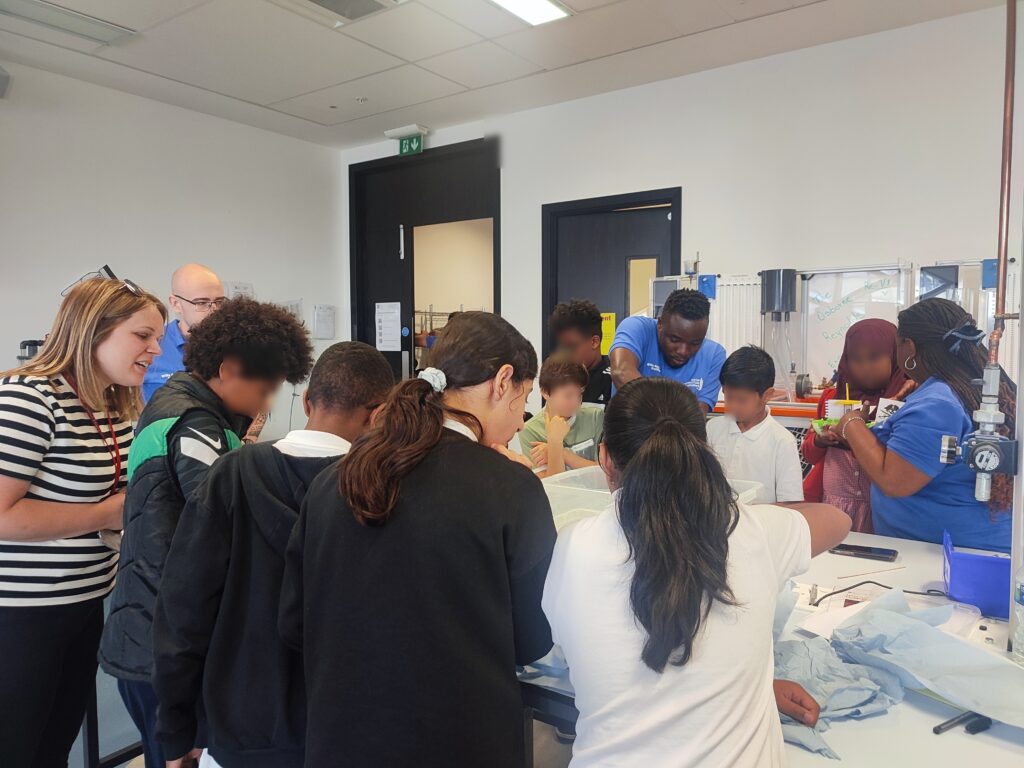
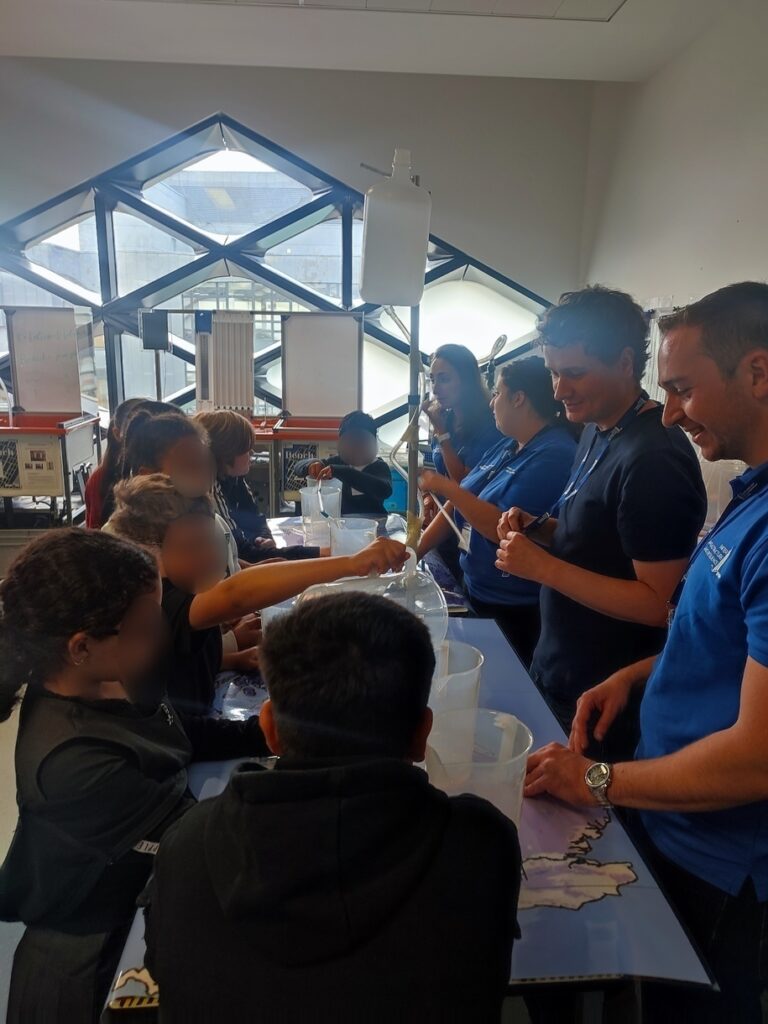
The students at The Diamond presented four different activities. One was about how water is supplied to cities, which they showcased through an interactive game of understanding the cost of water supply vs cost of bottled water and by using different sized pipes to depict water flow, and how that affects the flow of water to each city. The second showed the ways in which water buoyancy is managed through an exciting and competitive game of pirates, boats and marbles as weights.
The third highlighted the use of water movement to generate energy, using a mini turbine to show the effect of water movement on the spinning of the turbine. Students talked about their experience of visiting a windmill on a school trip and asked them to compare what they’d seen previously to a turbine they were shown. They also used a handheld windmill, looked at the shape of the curves and asked them to suggest why they were shaped that way. They had a mini quiz that asked them some fundamental questions of hydropower and explained key terms that were probably new such as kinetic energy = movement energy. This proved to be the most challenging one for the students.
The final activity talked about water flows, using rubber ducks. The school children decorated their ducks in any way they liked and using a flow meter, tested to see if their duck flowed fastest from one end to the other. This was the most fun game for the students as they could interact with all the elements involved and make a race out of it.
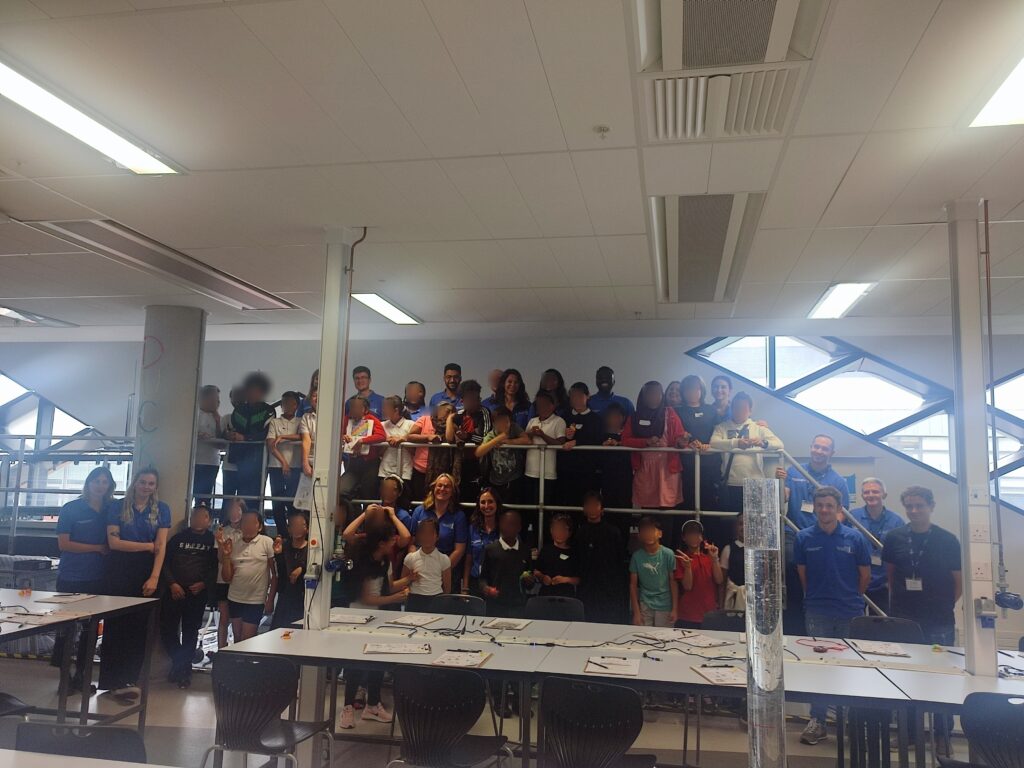
At ICAIR, the students conducted four main activities. In the first activity, the pupils learnt how to investigate sewage pipes using the full-scale sewer pipe testing facility to create replica blockages (to represent things like wet wipes, fat bergs in real life) and then sent water down at various speeds (to represent normal or storm flows) with rubber ducks floating in it and timed how long they took to get through. They used CCTV cameras to identify items in pipes and then discussed on which of those items are likely to block sewers.
The second activity was to look at water distribution networks using the smaller scale water pipe test facility to understand flows through pipes and the forces involved in a typical water distribution network, ensuring that each ‘tank’ / house received an equal amount of water.
The third activity was about investigating blockages, a follow-up on the sewer blockage activity, where the students dropped rubber ducks of various sizes into the pipes to see which would arrive first at the end of the test cell. There was a discussion on blockages and fatbergs and impact on sewer systems post the activity.
The final activity was about water flow monitoring where a desktop pipe network was used to simulate what would happen if there was a pipe leakage. The students were able to use simple formula to calculate how much water was lost to a leaking pipe after a given time.
Post the activities the schools shared adorable thank you cards with the WIRe students, expressing their enthusiasm for the activities organised as well as the pizza that the team got them for lunch!
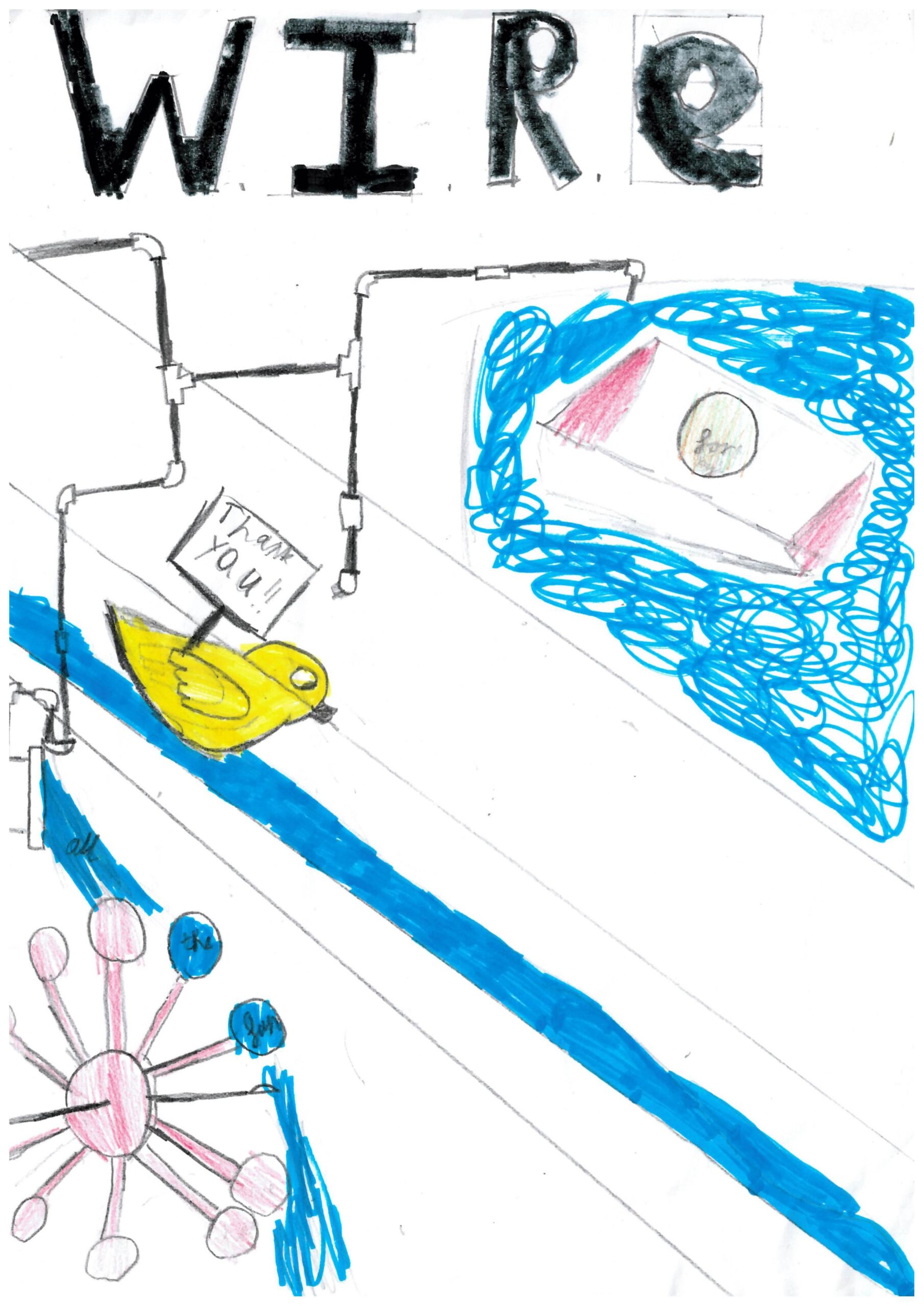
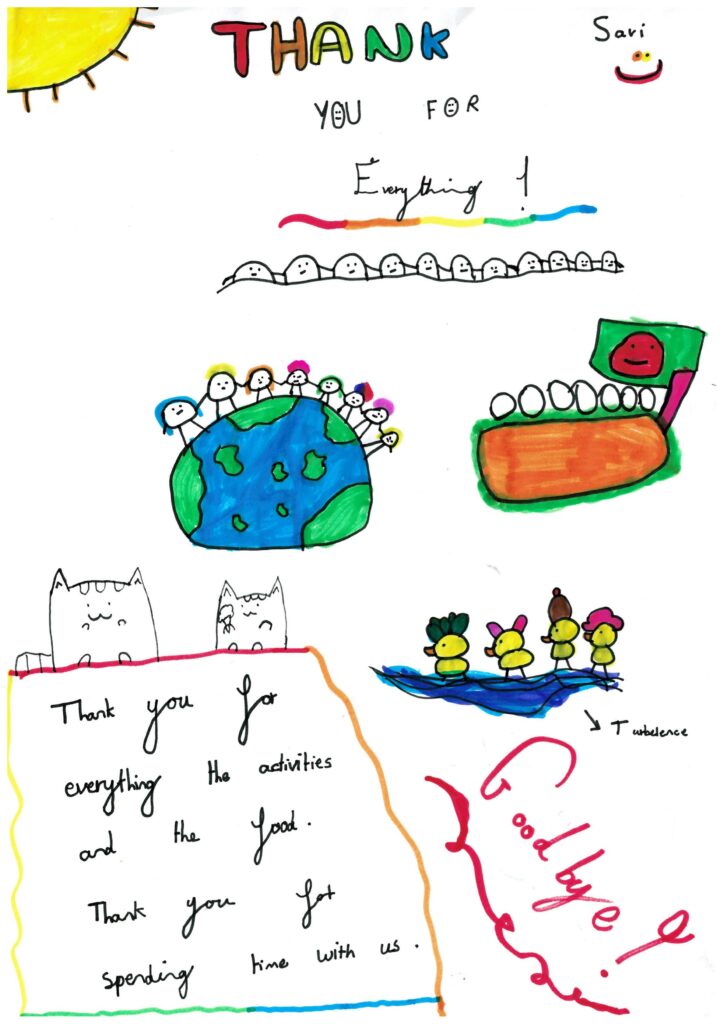
The WIRe students reflected on their key takeaways from the outreach activity, what they learnt from the experience of explaining the science behind their activities to school children.
The Summer Challenge Week was a stimulating time for the WIRe students to step out of their comfort zone and engage in activities that they normally do not, as part of their PhD. Well done all, you did a great job!
We look forward to another exciting Summer Challenge Week next year!
Anna Laino Participates in the 8th IWA WRRmod Conference
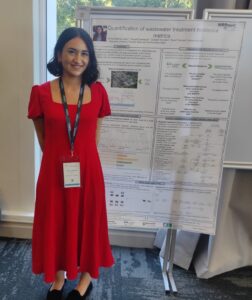
Anna Laino from Cohort II of the WIRe CDT presented a poster on ‘Quantification of wastewater resilience metrics’ at the 8th IWA Water Resource Recovery Modelling Conference held in Stellenbosch, South Africa from 18-22 January 2023.
WIRe Researcher Matthew MacRorie Conducts Research in Lahan, Nepal
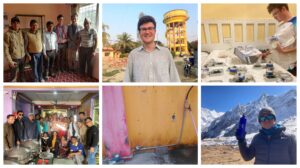
Matthew MacRorie, CDT WIRe researcher, spent over three months in Lahan, a small city in Nepal, along the South-East border with India. Lahan is the focus of The Beacon Project, a collaboration between Anglian Water, WaterAid Nepal and the government water utility Nepal Water Supply Corporation (NWSC) to improve the water and sanitation situation in the city.
As part of the visit, Matthew and Beacon project partners, conducted 60 household surveys to understand their experience with piped water supply, how they adapt to the intermittency of the piped water and the ways in which they would like the water supply to improve. Along with the surveys, the team also installed smart water meters in the households to record water usage every minute and used a SIM card to transfer that data to a web-based platform to track water usage from the UK. The combination of the smart meters and surveys allows for a greater understanding of the variation in water access within an intermittent water supply network and the challenges of transitioning to a continuous supply system.
Matthew also had the opportunity to trek around the Manaslu circuit and visit Pokhara and Surkhet. Know more about Matthew’s research here.
Peter Jarvis and Daniel Ruth Participate in the 2022 Water Quality Technology Conference
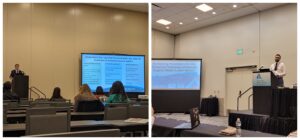
Peter Jarvis, Director of CDT, Cranfield University and Daniel Ruth, CDT WIRe researcher participated in the 2022 Water Quality Technology Conference, organised by the American Water Works Association.
At the conference, Peter was a speaker at a session on ‘Impact of Reduced Regeneration Frequency on the Ion Exchange Equilibrium for Removal of Organic Matter and Inorganic Ions’ while Daniel was part of the session on ‘Monitoring the Right Parameters for the Enhanced Treatment of Natural Organic Matter Laden Water Sources’.
CDT WIRe Cohort I Researchers Attend A Scientific Writing Training and Retreat

CDT WIRe’s first cohort participated in a weeklong scientific writing training and retreat recently. The retreat aimed to help the students understand the need for scientific writing; learn more about the publication process; strategies and techniques to writing; barriers to scientific writing and how to overcome them; and also, to learn from their peers.
During the week, they attended sessions on ‘My approach to writing’ by Jerry Knox from Cranfield University and Fran Pick from the University of Sheffield. The students brought a piece of their research work to the retreat (data set, non-started or an ongoing paper) and worked on it using their learnings from the retreat; and peer reviewed work of their peers.
Harry Nicklin Wins Best Poster Presentation Award at the EBNET Early Career People in Water Conference
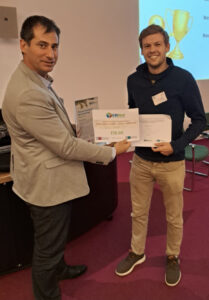
CDT WIRe researcher Harry Nicklin, from Cranfield University, won the best poster presentation award at the EBNET Early Career People in Water Conference held at Cranfield University recently. Harry’s presentation was on ‘Understanding domestic water use behaviour using smart sensor-based behavioural interventions.’
Jade Rogers, Reinar Lokk, Edward John and Matthew MacRorie – University of Sheffield – WDSA-CCWI Conference 2022, Valencia, Spain
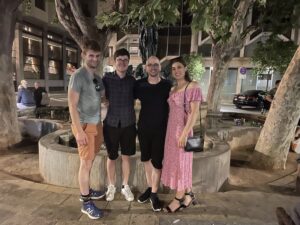
CDT WIRe researchers Jade Rogers, Reinar Lokk, Edward John and Matthew MacRorie from University of Sheffield presented their research from their PhDs at the WDSA-CCWI Conference held in Valencia.
Charalampos Ntigkakis and Brian Thomas – Newcastle University – European Union of Geosciences General Assembly 2022, Vienna, Austria
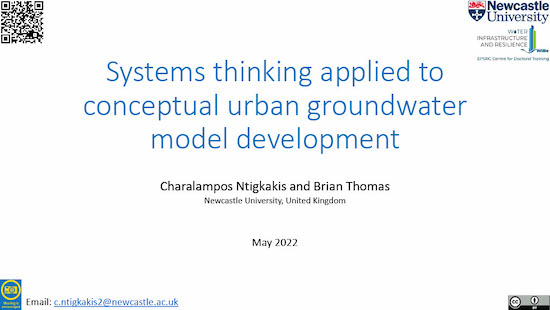
Killian Gleeson – The University of Sheffield – Water Quality Technology Conference 2021, Tacoma, US 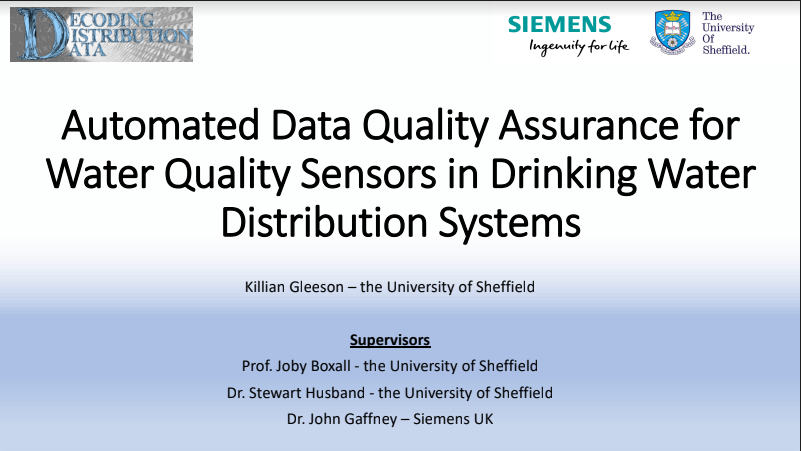
Ravina Bains – Cranfield University – 9th Conference of the UK Wastewater Network 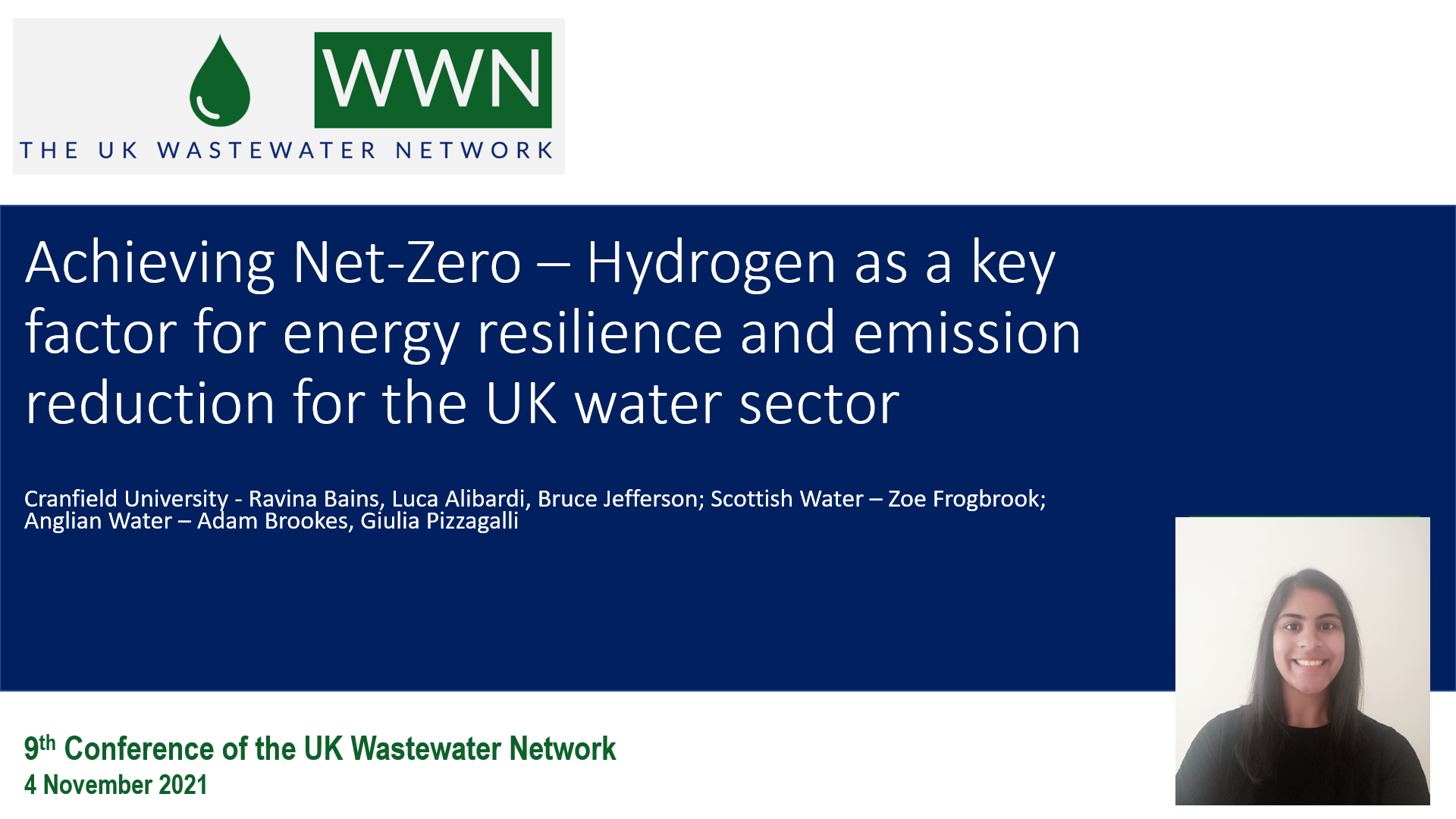
Phillipa Mohan – The University of Sheffield – UDM Conference 2022, Costa Mesa California 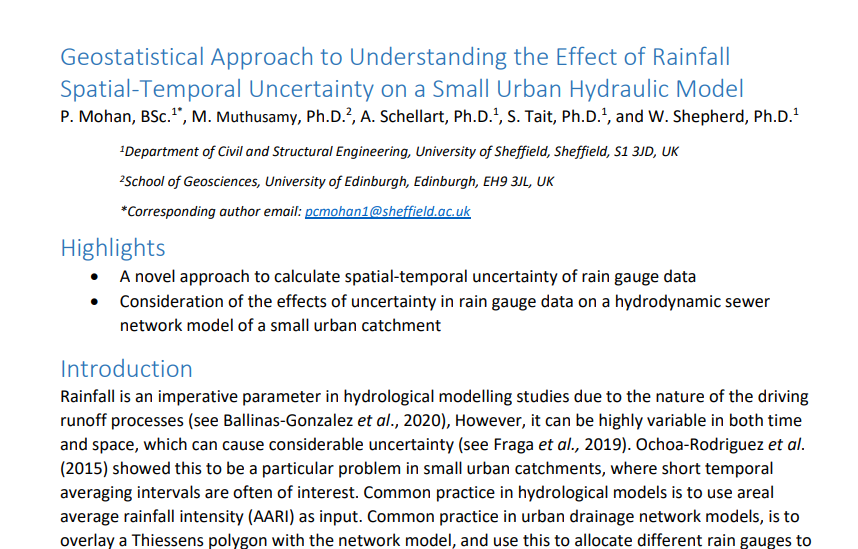
Matthew MacRorie – The University of Sheffield – WaterAid water supply coordination meeting 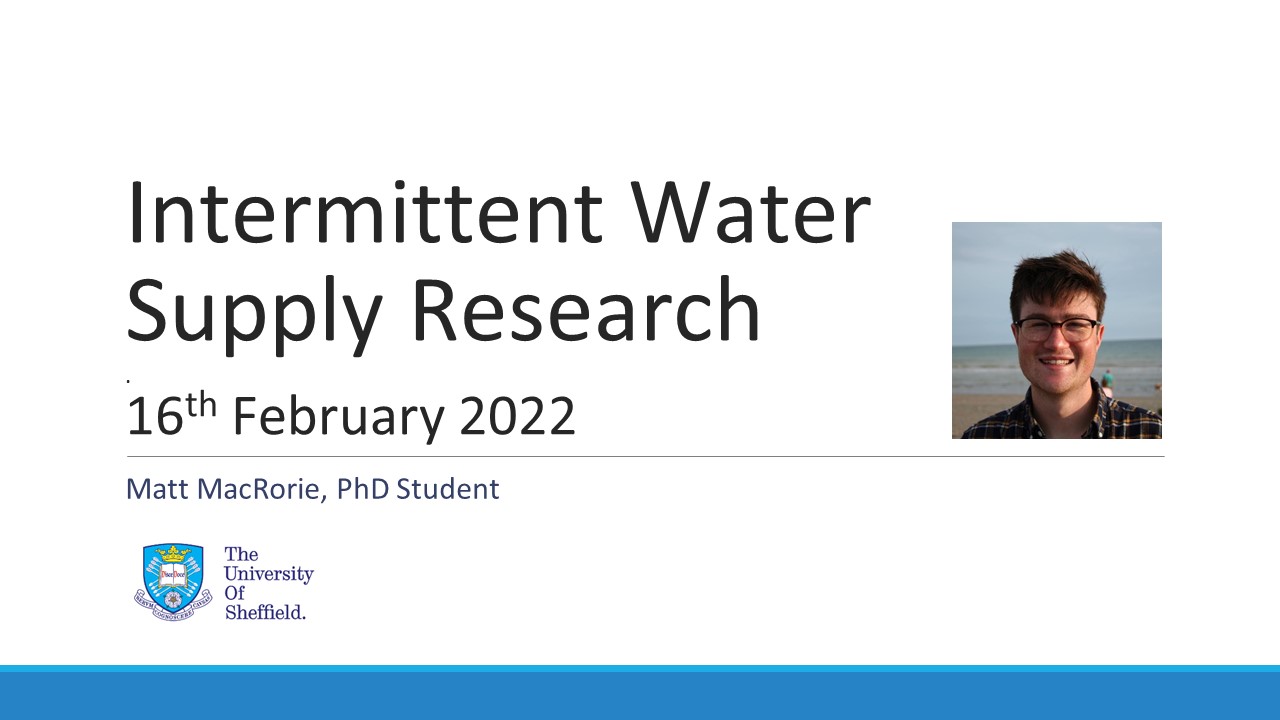
Charalampos Ntigkakis – Newcastle University – EGU General Assembly 2022 